Meeting Every Cyclist's Needs, No Matter What it Takes
The Pennsylvania Center for Adaptive Sports shows that with a little bike grease and community, the universal joy of biking can be accessible to everyone of any ability.
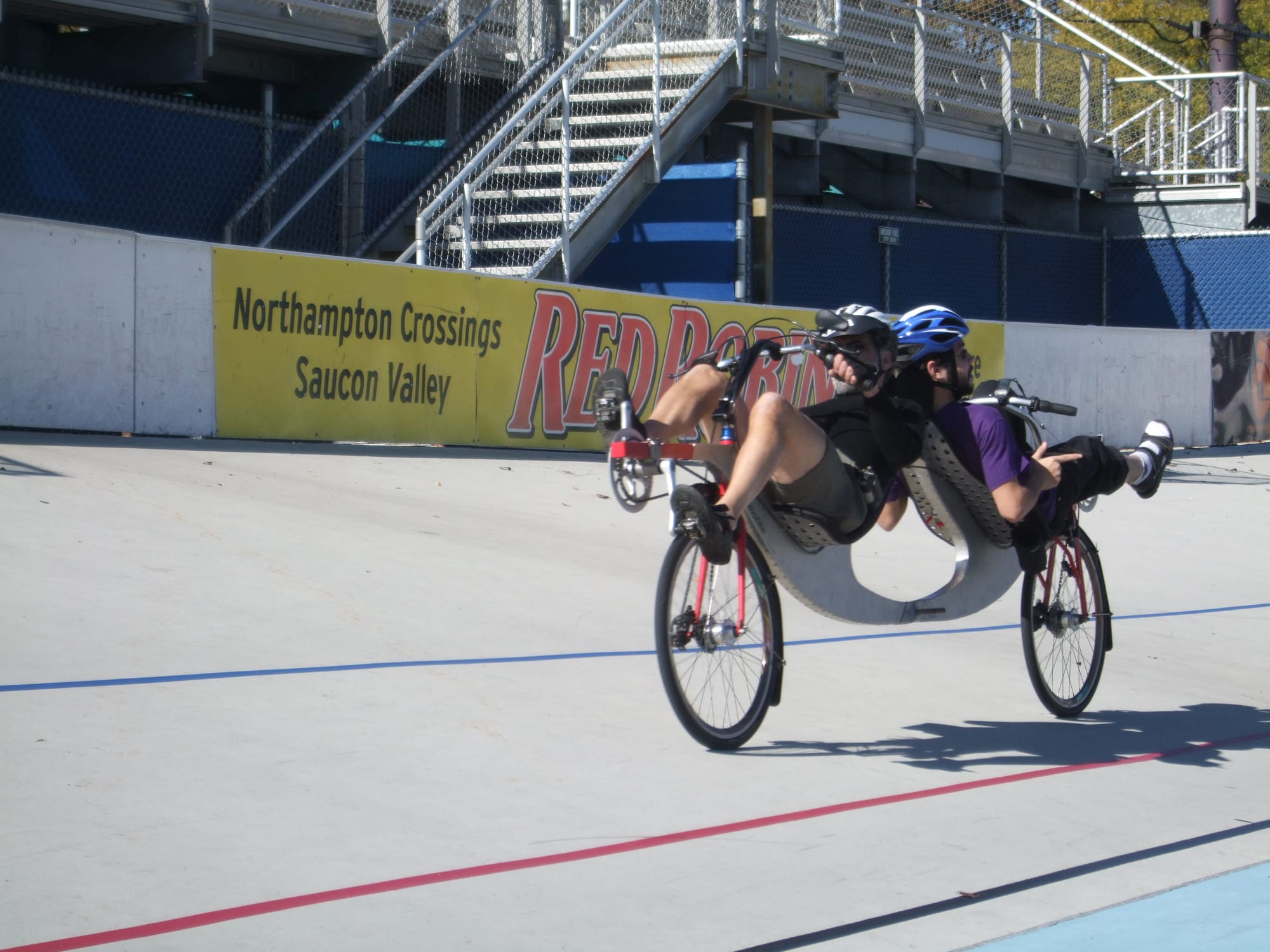
I’ve ridden down MLK Drive a million times without ever noticing the nondescript shed. I was there on a recent Saturday to meet the always-friendly Bernadette, who was there as usual to open its door. There, she revealed the smorgasbord of bikes - tandems, hand-cycles, tadpoles, deltas, super short bikes, recumbent bikes, and any adaptation imaginable. One by one, we wheeled them out to display in the parking lot, and then we waited.
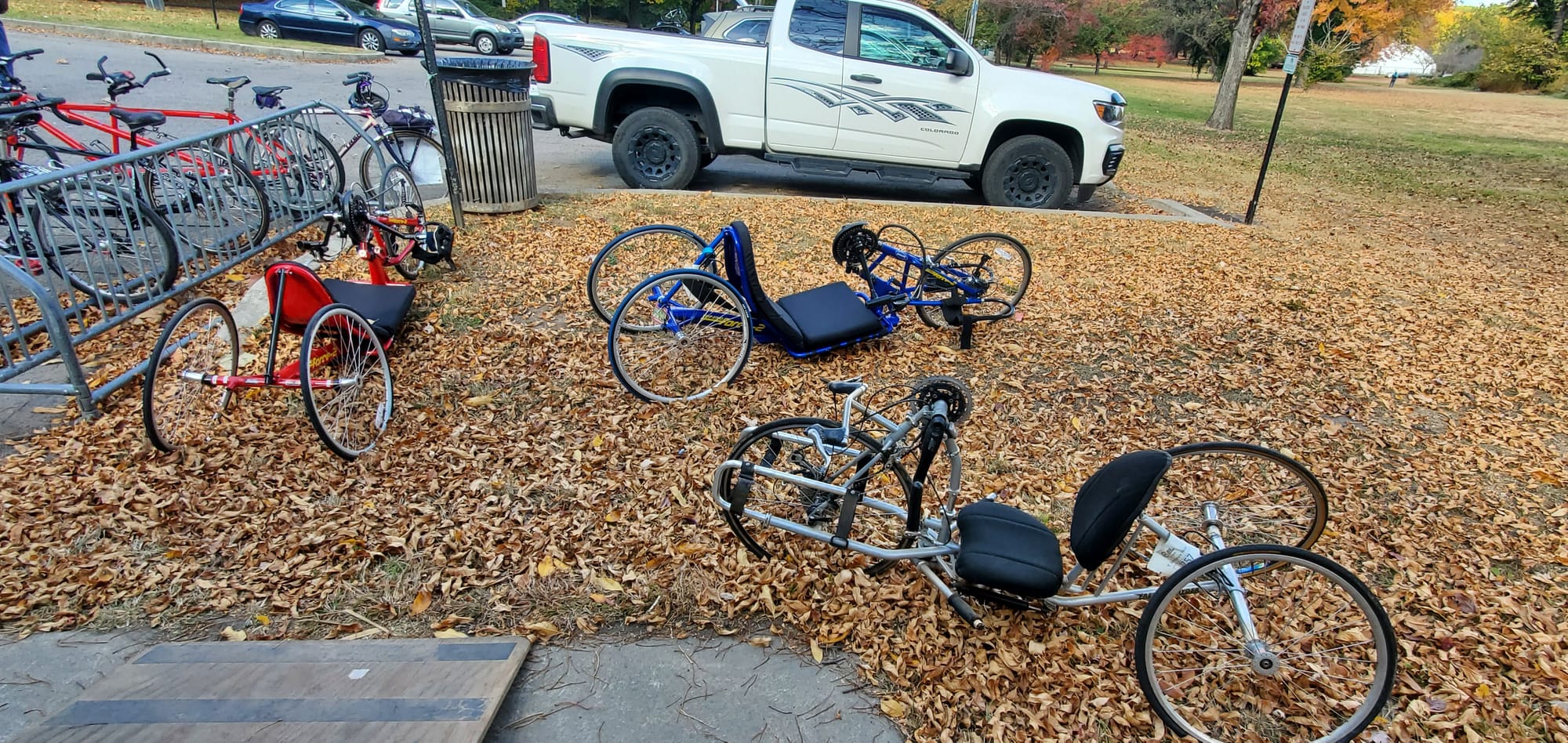
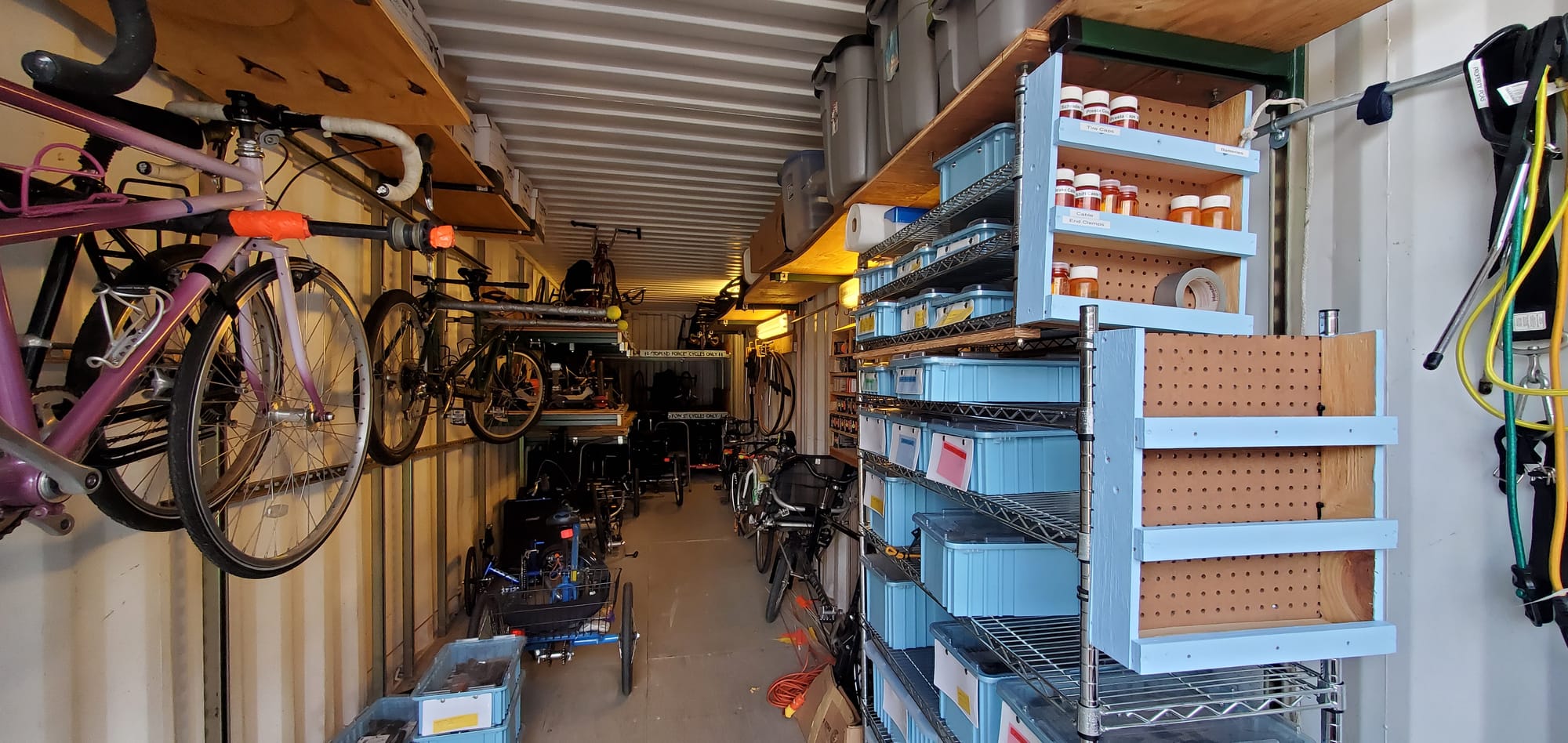
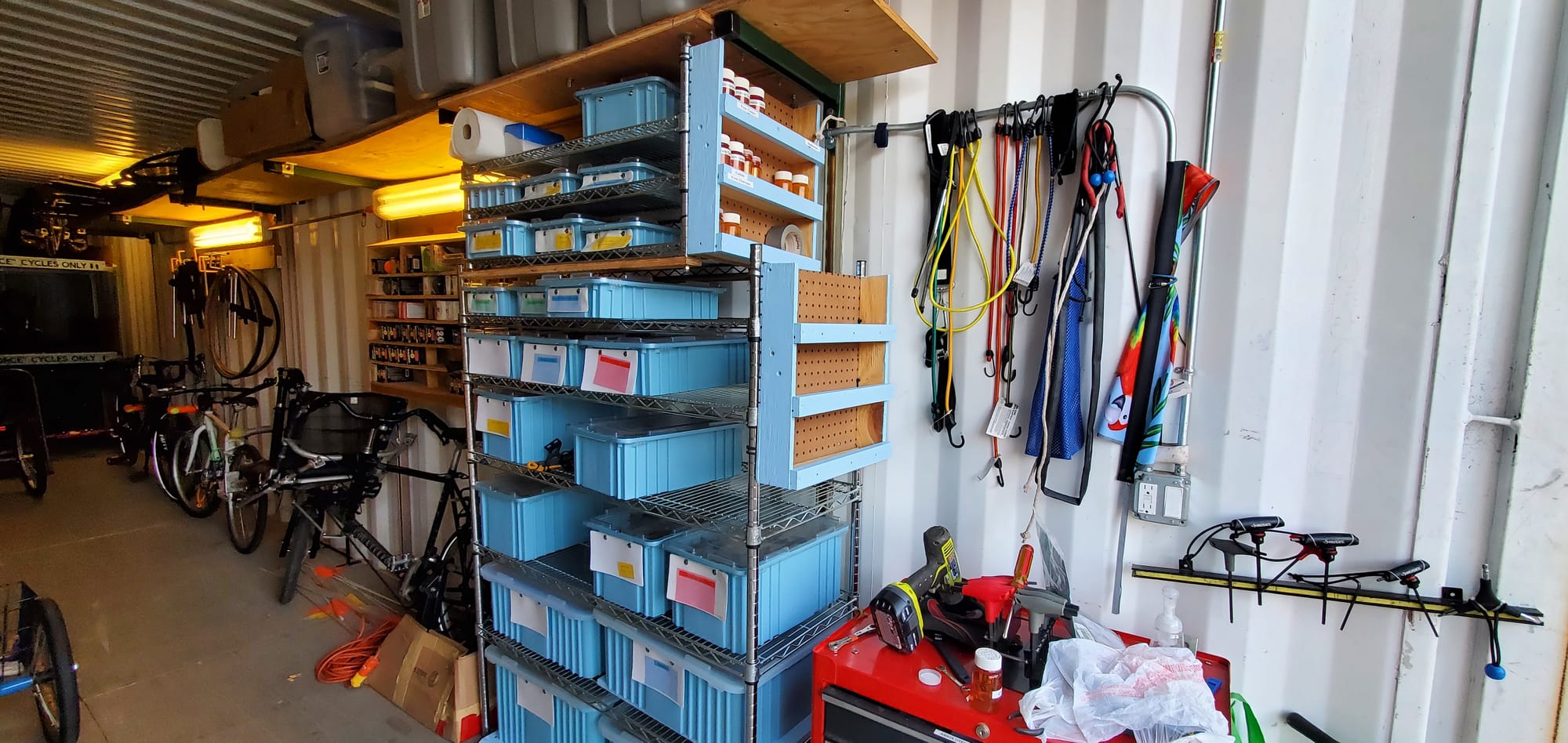
PCAS has a huge variety of adaptive bikes and works tirelessly to maintain them.
And one by one, folks began to show up. They talked with Bernadette or the other volunteers – Alana, Jeff, John – who got them set up with a bike from the shed if they didn’t have their own. Not many programs provide bicycles for folks to ride, and PCAS won’t turn anyone away.
“There hasn’t been a single cyclist who has come to us with a need we couldn’t meet.”
This is just another Saturday for the folks that manage, run, and ride in the Pennsylvania Center for Adaptive Sports, or PCAS. PCAS began thirty years ago, and had about 34 athletes and 20 volunteers participating in the cycling program this past year in both Philadelphia & Exton, where they have Saturday morning rides. In addition to cycling, they have hiking, rowing, skiing, birdwatching, rock climbing, and have trained several Paralympians in the process. With nearly 250 volunteers and 500 participants across all of its programs, it has become a leader in providing sports and outdoor recreation to people with disabilities.
I’ve worked to get folks outside in one way or another since college, so I was 100% on-board with the organizational mission. After volunteering once, I was hooked. Their organizational mission is to improve the health and well-being of people with disabilities through inclusive sport, wellness and recreation programs.
But PCAS goes beyond getting folks outside.
There was something about this cycling community that hit different from other social bicycle spaces, so that Saturday I chatted with some of the volunteers & athletes about what makes this group tick.
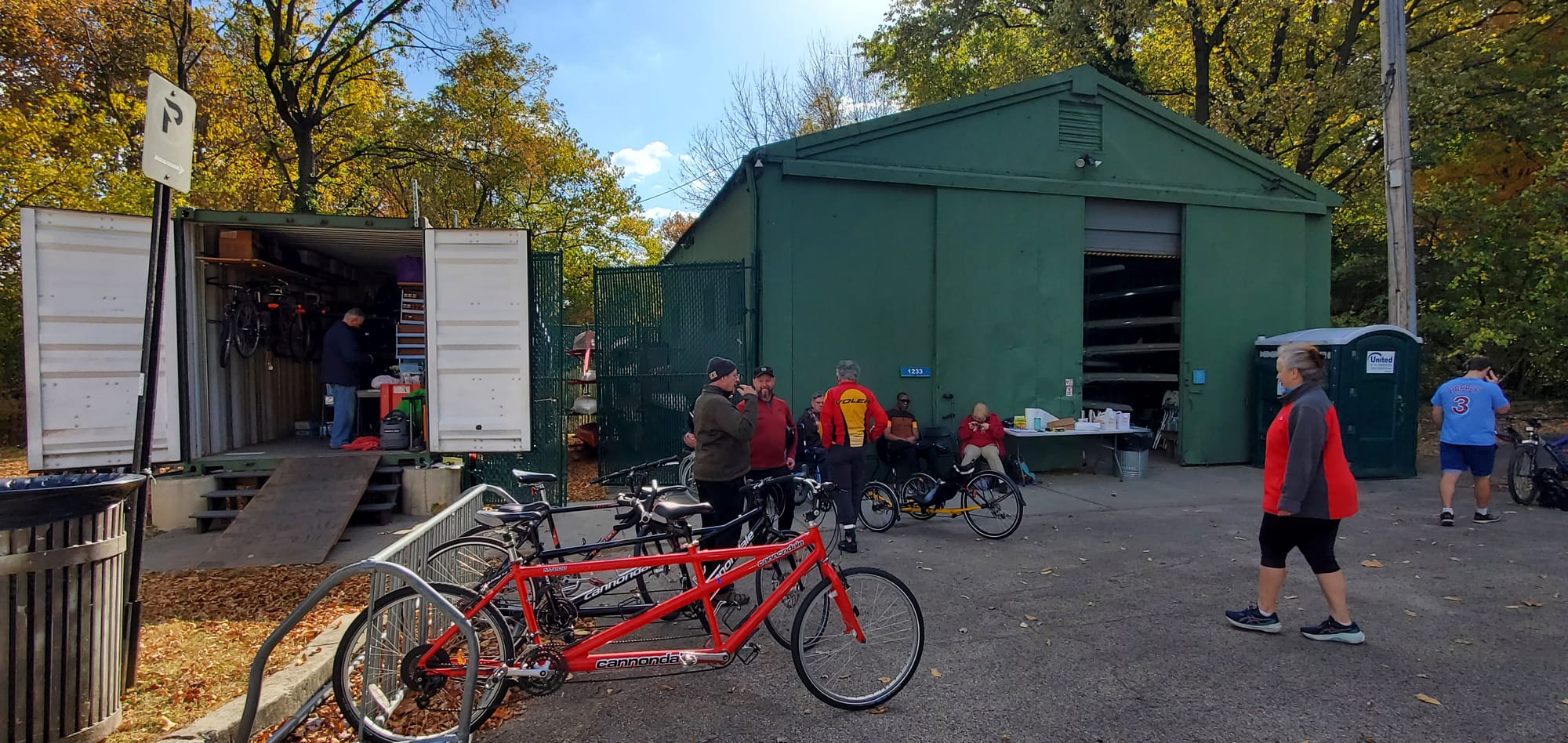
Reflections with John
I started with John, who has been volunteering with PCAS by providing repairs and fiddling with adaptations for twenty years and was recently featured in WHYY. He jumped in to say: This is the Philadelphia cycling community’s best kept secret. Cycling is one of PCAS’s only programs where folks can just drop in without a commitment, which means the crowd that comes each week changes and keeps things interesting. He highlighted how the social aspect is one of the best things about the program because of how isolating having a disability can be. People come here and learn from each other’s shared struggles.
When talking about why the community in PCAS is particularly special, he had a great response: “As a general rule of thumb, assholes don’t want to volunteer, so there’s a great self-selection and it’s all positive energy here. I can’t make the whole world better, but if I can make one person’s life better, that feels like a pretty good thing.”
He told me about experiences riding with PCAS over the last twenty years. One time he rode with a woman on the back of his recumbent tandem and she started crying. He worried something was making her uncomfortable and asked, “What’s wrong?” She responded, “Nothing’s wrong. I just never thought I could do something like this ever again.” To John - and everyone at PCAS - that’s a win.
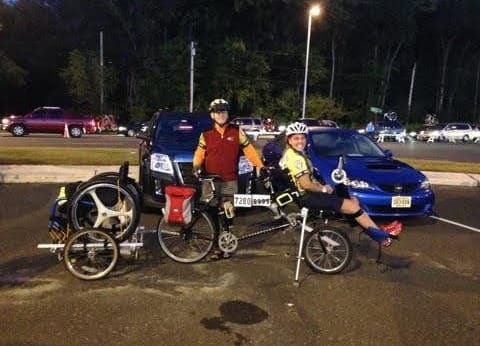
Since the 90s
Before booking it down the trail, I also chatted with James, a cyclist who is visually impaired. He boasted accomplishments like riding the Scenic Schuylkill Century several times and riding across the state of Pennsylvania in 2009.
James found PCAS by accident in the late 90s. He’d heard about an American Heart and Lung Association charity ride on the radio and called to ask whether there was a tandem rider for cyclists who are blind like him. He got connected with a few volunteers at PCAS and they’ve been riding tandem together ever since. Recognizing that he has been involved since the early days, I asked him how PCAS has grown and changed. He said that many people think once they have a disability or physical challenge, there are no physical and outdoor recreation opportunities for them. PCAS has grown over time to show them that there is. “It’s a wonderful program,” he added warmly.
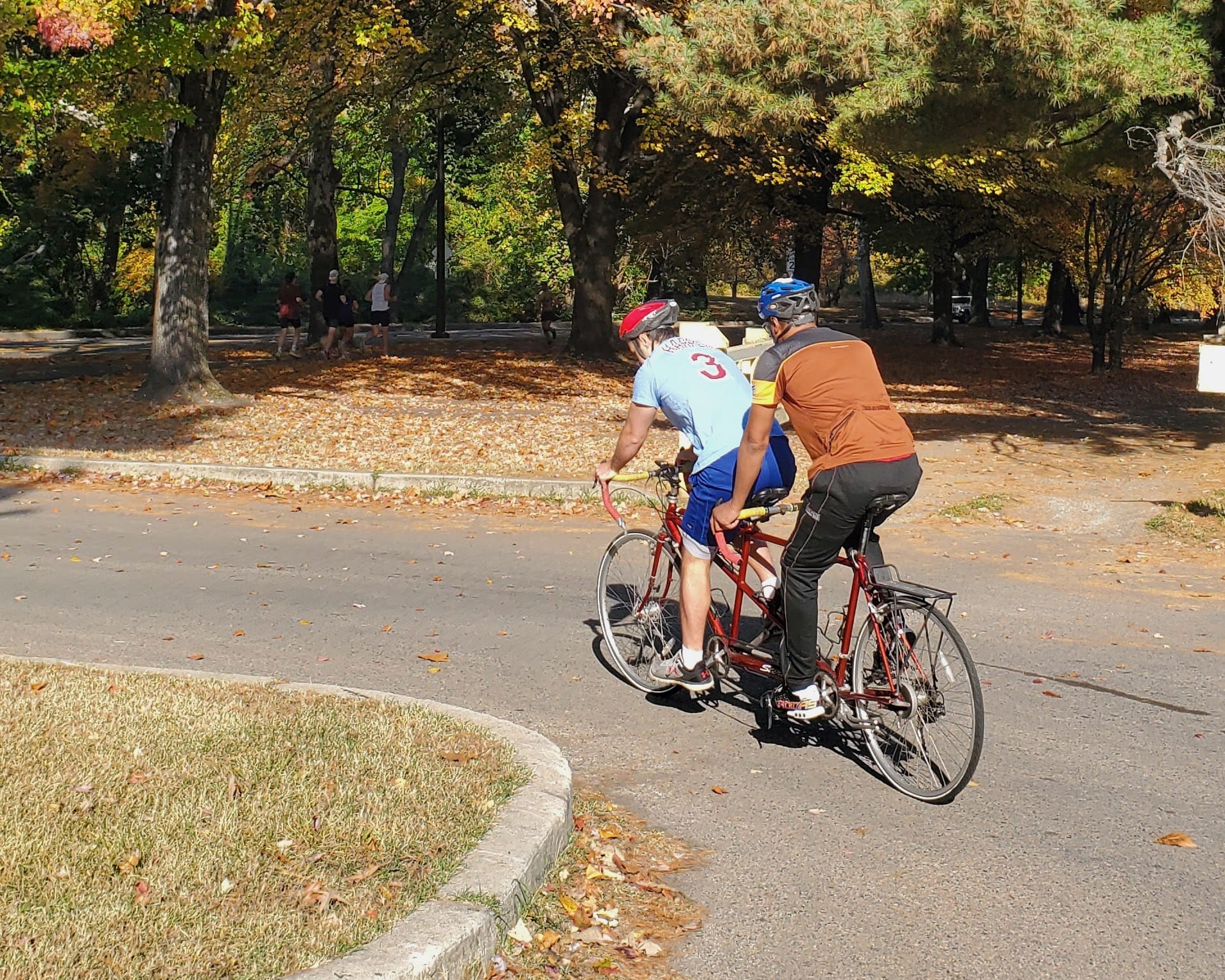
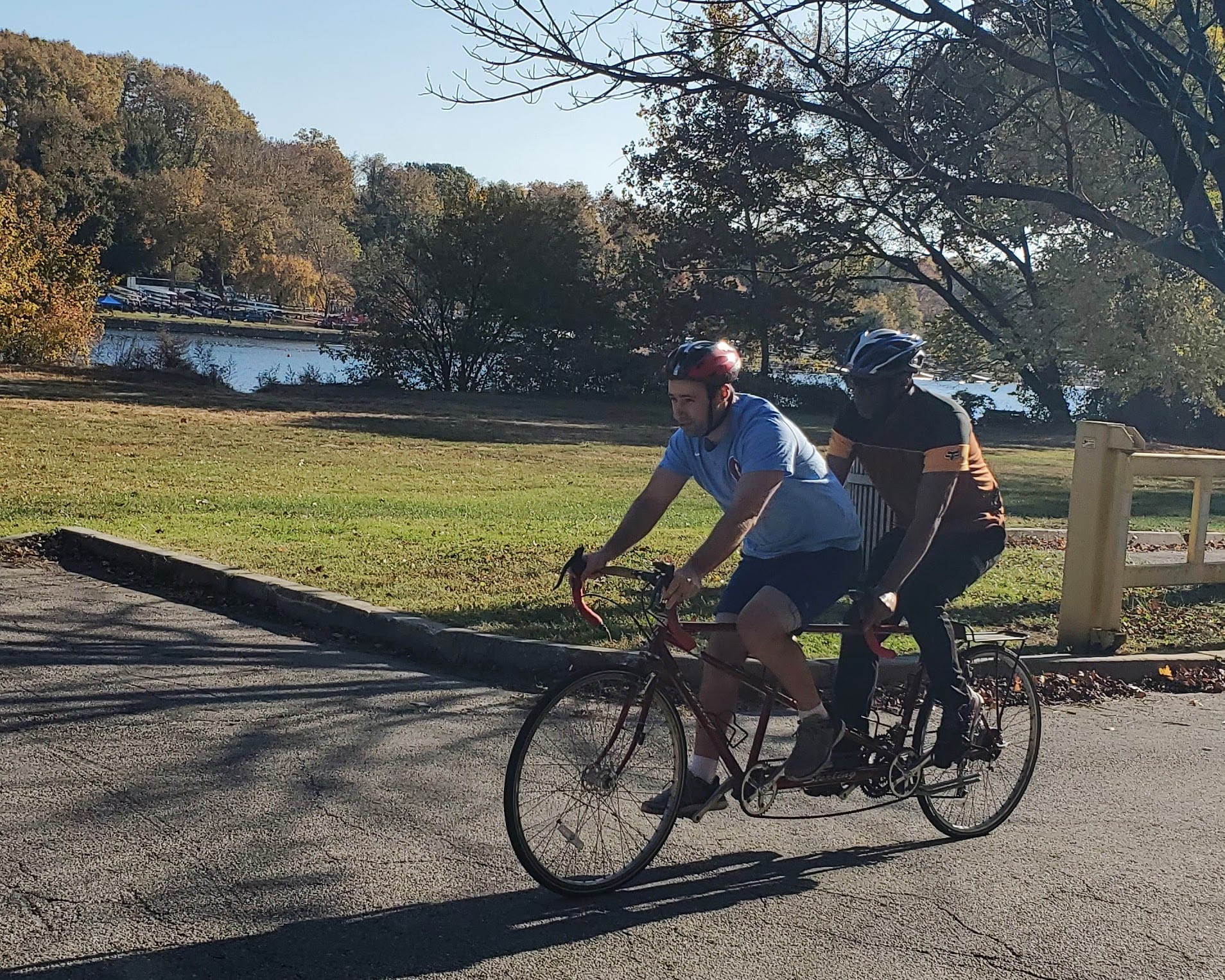
James (rear) takes off on the tandem for a ride along MLK Drive.
A Ride with John
After schmoozing for a few minutes, some more athletes rolled up ready to ride, so I headed out with another rider named John down the trail. John is one of the newer athletes to PCAS and spoke with me about how much this program means to him. He highlighted how wonderful it is that there was such a variety of bikes and that the volunteers are the lifeblood of the program. John just moved to Philly and said exploring its rich history and living in Center City has been fantastic.
"[MLK Drive] is a beautiful place to ride, but mainly, it’s about the people."
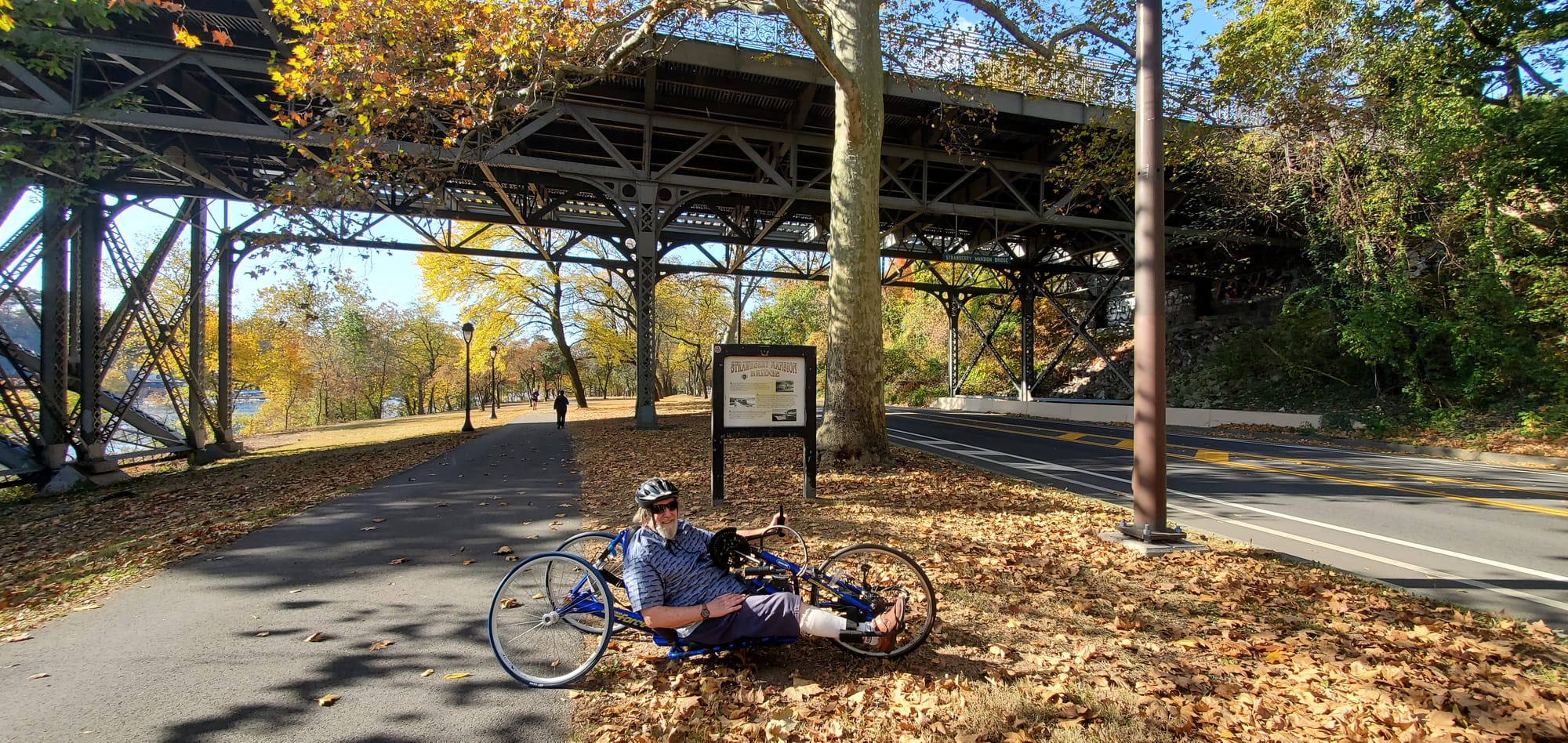
That day, MLK Drive was open to regular traffic, so we squeezed onto the bike path with runners and other cyclists while chatting. Since MLK Drive was closed during COVID-19 on weekends to vehicle traffic, there have been growing calls to extend weekend closures beyond April to October. Other than MLK Drive, there are limited places in the Philly region where cyclists - with or without disabilities - can ride safely. Many trails are disconnected from each other or not designed to accommodate some of the wider bikes used by adaptive cyclists. Parks are often filled with speeding cars, and bike lanes are rarely designed wide enough for more than just a standard bicycle.
We finished our ride with the warm sun and a cool fall breeze, while admiring the rowing regatta on the Schuylkill River.
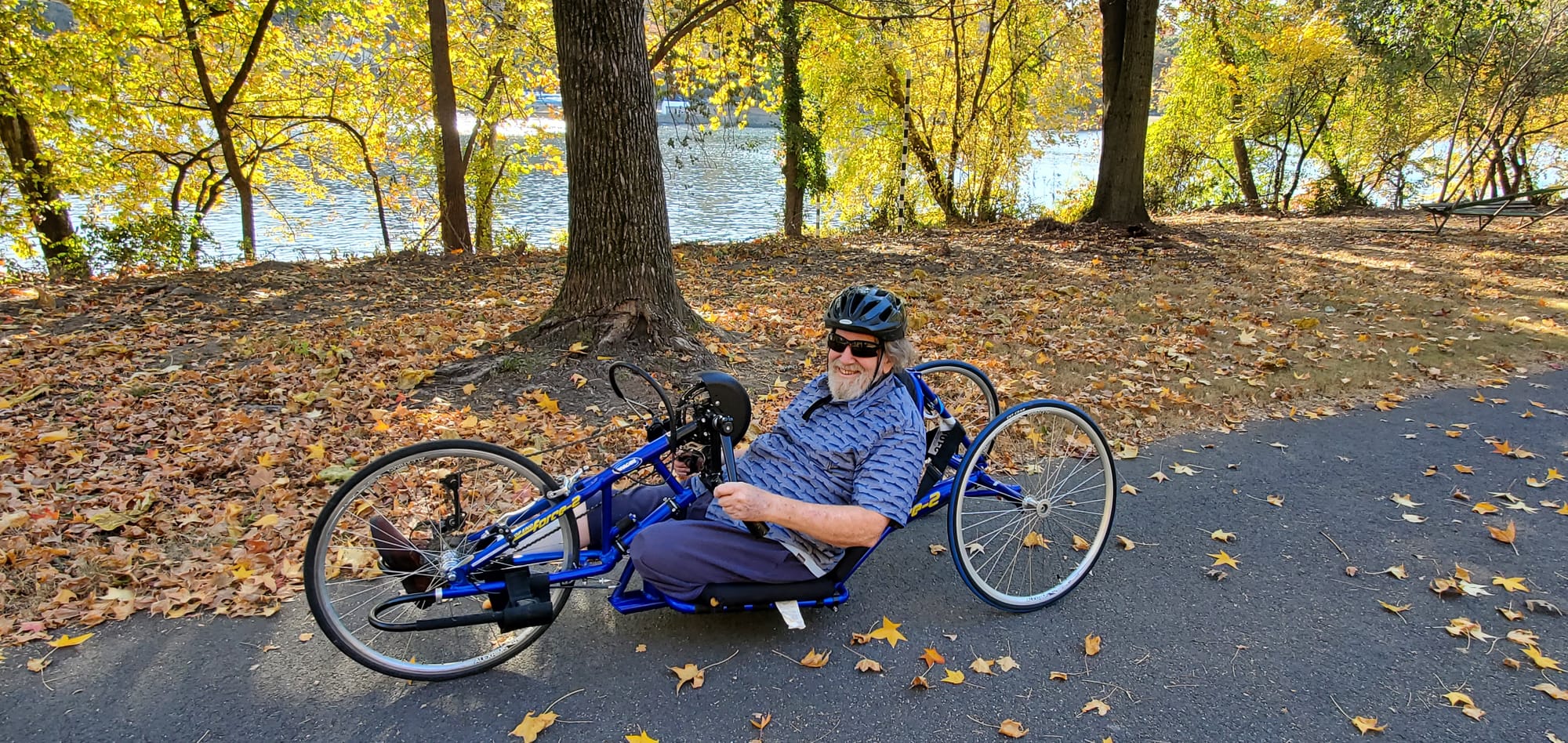
John uses the handcycle down MLK Drive.
Shared Sentiments
A sentiment shared by all at PCAS was that having a safe space – both physical and social – is the key ingredient to such a special & successful cycling group. This struck me because regardless of ability, age, or experience, that’s what everyone wants when they want to go for a bike ride. Everyone wants a ride where they feel that perfect breeze, look out at the colorful leaves dotting the Schuylkill River, build up a sweat, and coast downhill with friends and without worry. It's a universal experience. Everyone spoke about the independence, confidence, and relaxation they feel when riding a bike. They talked about how riding a bike for an hour or two fundamentally improves people’s lives for days beyond the ride. The feelings, community, joy, and struggle we all love about biking should be accessible to all; the community at PCAS proves that it’s possible.
I also learned about the challenges many people with disabilities face when trying to get involved in the cycling community. While most rides say whether they are drop or no-drop (are you on your own if you lose the group or will everyone stick together), many rides don’t advertise whether routes are accessible to adaptive bikes and what average riding speed to expect. I heard folks talk about feeling stared at when they are simply doing their morning workout, or insensitive remarks made about being on adaptive bikes. It highlighted the work that still remains to make the broader cycling community more inclusive.
As we watched the volunteers and athletes slowly depart, I kept chatting with John (the volunteer) while admiring his recumbent bike, tricked out with a windshield and magnetic clip-in pedals. I asked him what it was like working on adaptive bikes.
“It’s the same parts, but oriented differently”
He commented that these bikes are expensive, often thousands of dollars, and while they are often perfect for individuals, they aren’t easily adjustable. It’s time consuming to make some modifications, like moving all the controls on one side of the bike, or adjusting where the pedals or seat position are. Sometimes it takes four to six adjustments before a bike can work for any individual. This makes it challenging to share amongst the many athletes that come to PCAS to ride. PCAS hopes to recruit more mechanically inclined volunteers so that athletes spend less time waiting around and more time riding around.
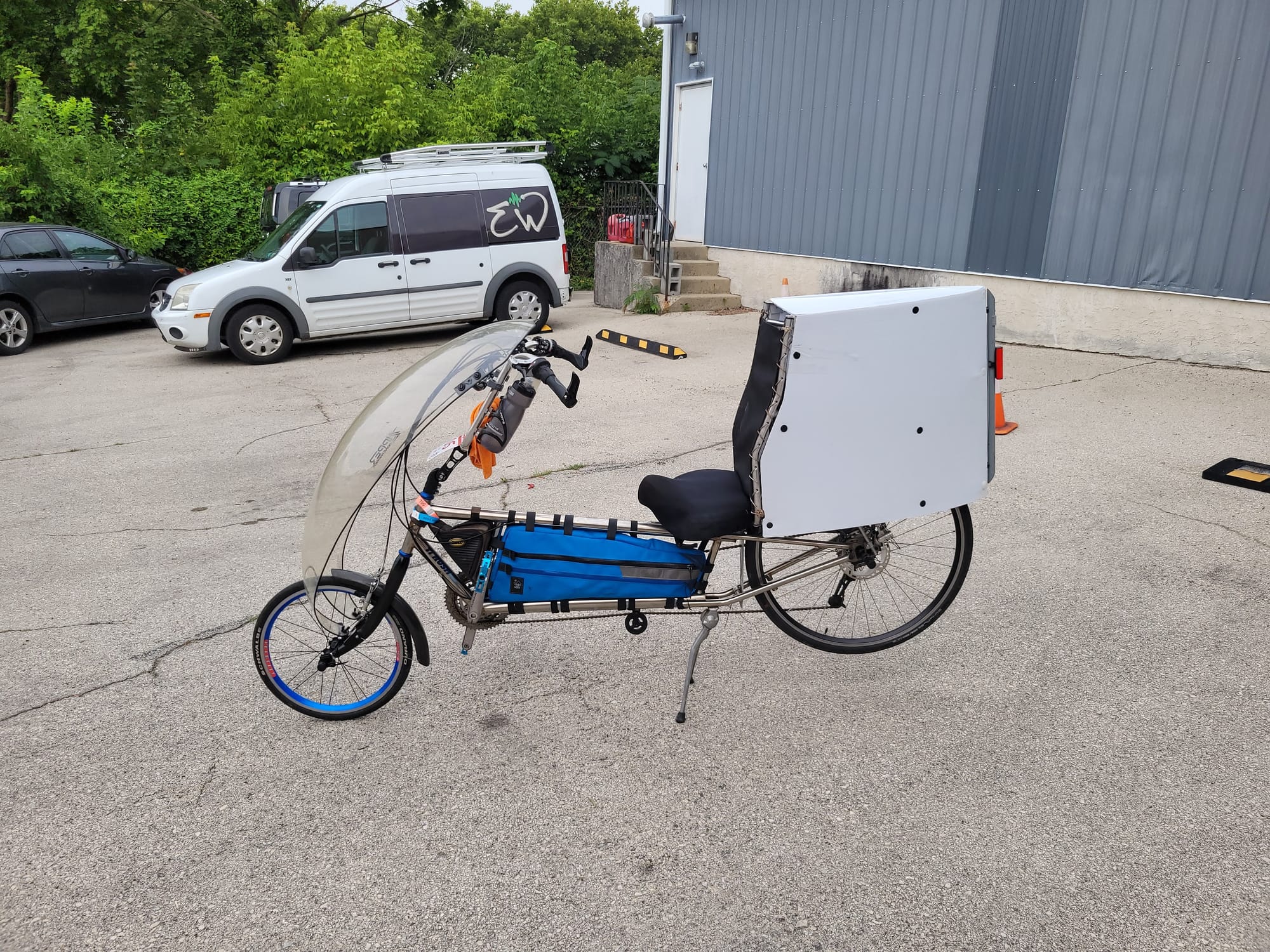
I asked John what’s changed since he joined, and he reflected how more people seem to find PCAS, but that there’s still room to grow. This sentiment was echoed by other volunteers and cyclists alike. If more people come, more people can get on bikes.
John also wished there were more places to ride for adaptive cyclists. Blocking traffic on roads for more free cycling events and having wider trails could bring Philly accessibility to the next level. Importantly, he also noted the challenges many cyclists face in getting to those trails, like needing someone to drive them there or utilizing SEPTA CCT (a transportation service for people with disabilities and senior citizens), which can be unreliable. I was pleasantly surprised, however, to learn that adaptive bikes are allowed on SEPTA, which is pretty cool!
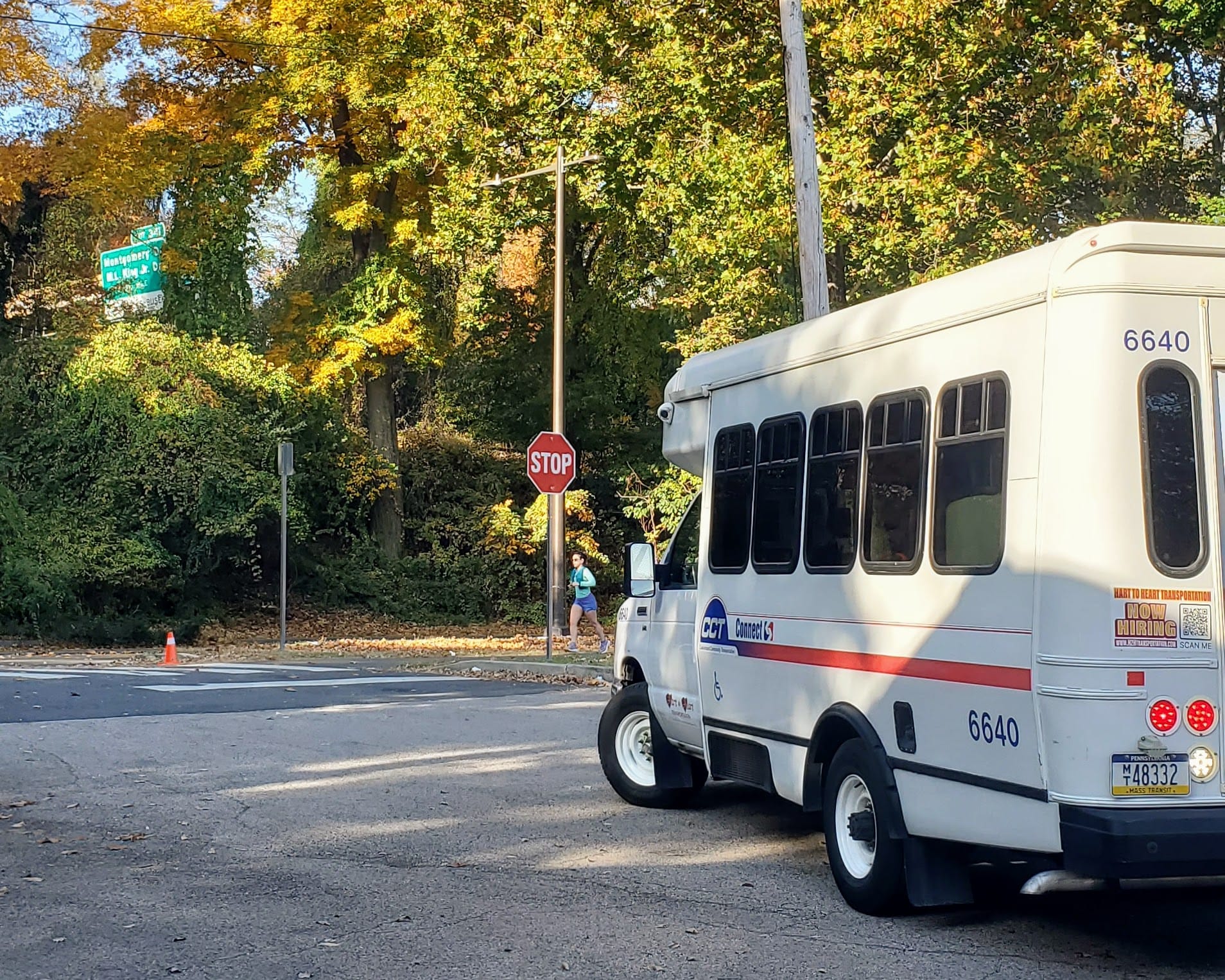
Collectively, PCAS’s vision for the future is to spread the word about this program so they can help any person with a disability who wants to ride a bike. PCAS also wants to recruit more mechanics & volunteers who are passionate about getting folks on bikes.
Because MLK Drive will reopen to cars on weekends, the cycling program ends every year in October and is now unfortunately over for the season. However, if you’re interested in participating or volunteering for the spring 2025 season (or in their other programs), reach out to PCAS here.

